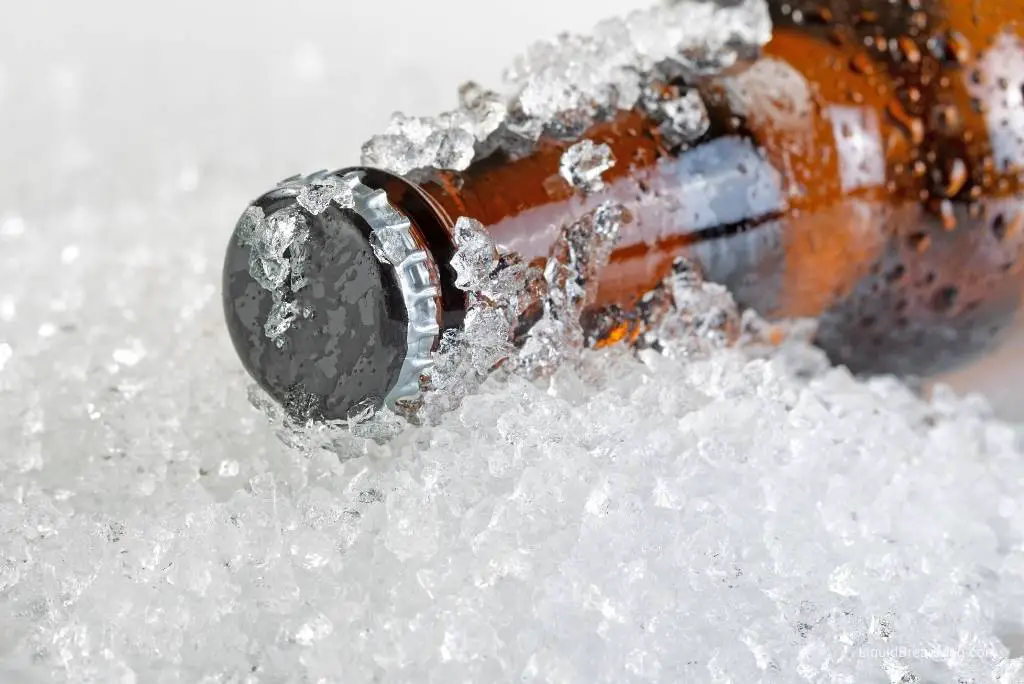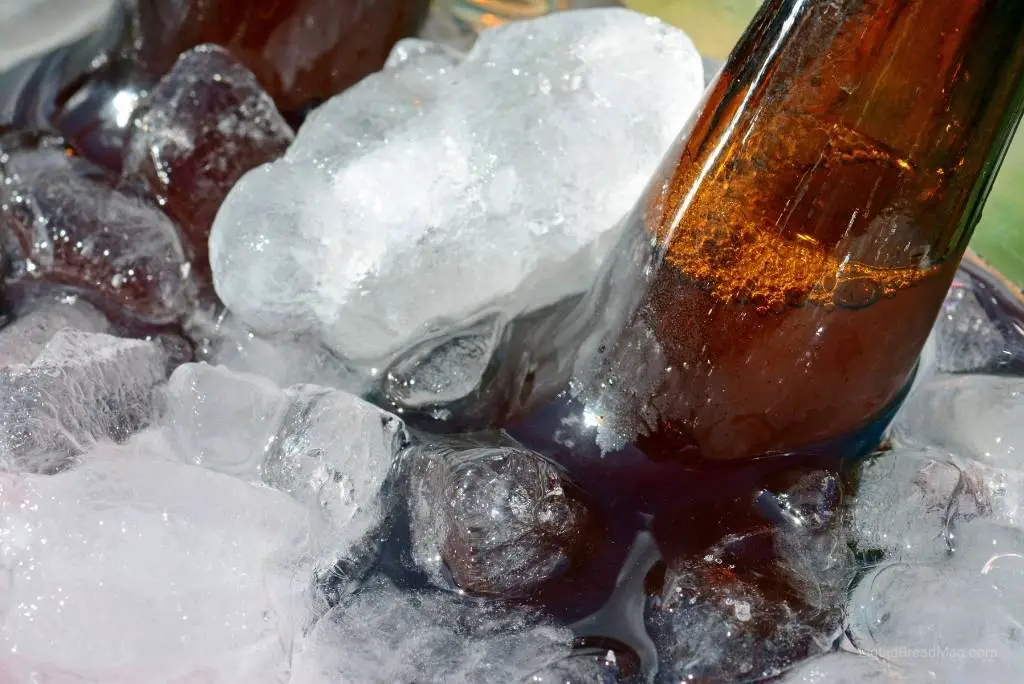In my experience, an ice-cold beer is one of the best ways to unwind after a long day, as it never fails to take the edge off. Leaving your beer in the freezer is a quick way to cool it quickly, but you might end up leaving it in there too long. If you let it freeze, then you may end up dealing with a much bigger problem.
The temperature that beer freezes at depends on its specific alcohol content, which may vary between brands and types of beer. Generally, for most beers with a 4-6% alcohol content, freezing occurs at 28℉ (-2.22℃). Other brands with a higher alcohol content might need lower temps to freeze.
It’s easy to freeze your beer accidentally, but you can prevent this from happening altogether. Keep reading as I delve deeper into the alcohol and sugar content and their specific role in lowering the freezing temperature so that you can know the exact freezing point for your beer.
Factors That Affect Beer’s Freezing Point

BEER DROP: Boxes of beer from Award-winning microbreweries → Join The Club
To effectively explain at what temperature beer freezes, significant factors need to be considered, such as the amount of alcohol and how much residual sugar is in the beer.
There’s a phenomenon called freezing point depression that occurs when other ingredients, like alcohol and sugar, are introduced into a water-based solution. Its effect results in the solution’s lowered freezing point.
In this context, this means that the higher the sugar and alcohol content, the longer it takes beer to freeze.
Alcohol Content
To better understand this, we must first look at a standard drink in the United States. According to the National Institute on Alcohol Abuse and Alcoholism, a standard drink contains 0.6 fluid oz (14 grams) of pure alcohol.
That said, each different alcoholic beverage has varying amounts of alcohol.
So, a can of regular beer usually contains 12 oz of liquid with 5% (0.6 fluid oz.) of alcohol. Compare this, for instance, with vodka, which is essentially pure ethanol.
Because a regular beer only contains 5% alcohol, beer is still primarily composed of water, which can freeze quickly. However, the alcohol helps lower the freezing point. Instead of freezing at 32℉ (0℃) like water, beer’s freezing point is a bit lower.
The precise cold temperature point for freezing depends on your beer’s alcohol content.
With that in mind, you should remember that there are beers that contain higher or lower alcohol content. While most regular beers have a 5% alcohol content, there are other beers whose alcohol levels fall above or below this level.
For instance, barley wines and Imperial Stouts have alcohol content levels at 8-12% and 9%, respectively.
There are also light beers which typically contain 4.2% alcohol content. In effect, while the most common freezing point for beer is 28°F (-2.22°C), it can be higher or lower depending on the actual alcohol content.
There’s a simple formula here that you can follow. It states that alcohol lowers the freezing point of beer by 1 ⅛ °F (-17.15°C) per percent of alcohol. So, an Imperial Stout beer with an 8% alcohol content will have a freezing point of 23°F (-5°C).
Take note, however, that the formula doesn’t yet include other factors such as sugar content.
Sugar Content
Another critical factor to consider is the amount of sugar in your beer. Similar to alcohol, the sugar in your beer also helps lower its freezing point.
However, the rate at which sugar does this is noticeably slower compared to alcohol.
To give you a more concrete idea of how this works, we need to look at the formula. It’s also worth noting that a 4:1 water-sugar solution has a freezing point of 26℉ to 27°F (-3.33℃ to -2.78°C).
This should give you a better idea of how it can affect your beer’s freezing point.
Chemical Changes When Beer Is Frozen
Introductory chemistry tells us that freezing is a physical change, which means that it doesn’t alter its chemical composition. However, like with any food or beverage that has been frozen, it creates more problems and effects on the beer, which can be detrimental.

Loss of Quality
It should be noted that freezing and thawing beer will undoubtedly affect your brew. Overall, you’ll notice a significant decline in quality. Specifically, it’ll lose its distinctive identifiers like its flavor profile and aroma. This is because freezing temperatures tend to hide the individual characteristics of the beer.
At the same time, the carbonation in the liquid itself is also undone, leaving the drink flat and tasteless.
It should also be noted here that while the alcohol content of a frozen beer will remain the same once it’s been thawed to room temperature, there will be a partial concentration of alcohol in the liquid parts during the initial melting stage.
This means that if you start drinking the beer as it melts, you’ll effectively be drinking higher doses of alcohol than you usually would.
Potential Mess
As water freezes, it expands. The same happens to beer.
Now, the problem is that it’s stored in a container (can, glass bottle, or keg) that may not handle this sudden change in size. That’s why one of the typical effects of freezing beer entails broken bottles and cans, which leaves you with a mess in your home freezer.
It might be better if you store beer in the refrigerator a few hours before you want to drink it, so that you don’t risk freezing it.
How To Get Your Beer Cold Fast
What if you’re ready to enjoy a nice cold brew right now but all you’ve got is warm beer? Fortunately, there is an excellent way to cool a beer down fast. We all know that adding your can or bottle of beer to a container or cooler of ice is a great way to chill a beer pretty quickly, but this can still take too long in my experience.
The best way to speed up this process is to add water to the ice. The ice surrounding a beer is great but due to air gaps, there are too many places where the ice isn’t actually touching the beer. By adding water, the ice can rapidly cool down the water and due to its fluid nature, the ice-cold water will completely surround the can or bottle of beer.
This will cool off a warm beer quickly. You can even speed up this process by giving your beer a gentle spin every few minutes to mix the beer in the bottle around. I’ve done this on many occasions and I can take a room temperature beer to ice-cold in about 5-10 minutes.
Conclusion
Beer is a drink that I find best-served ice cold. However, you mustn’t overdo it and leave it to freeze. This will not only lead to an overall dip in your drink’s quality and flavor, but you may end up having to clean up a messy freezer.
While regular beers typically freeze at 28°F (-2.22°C), other kinds of beer may have a slightly lower or higher freezing point. It all has to do with the specific alcohol level and sugar content of your beer of choice. The higher these two are, the lower your drink’s freezing point.
